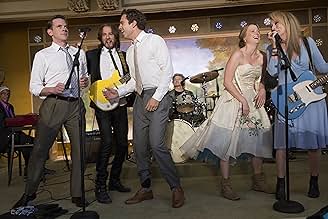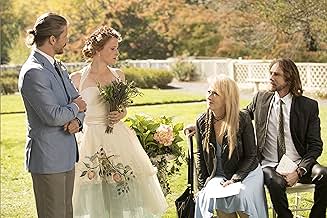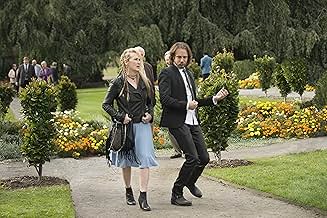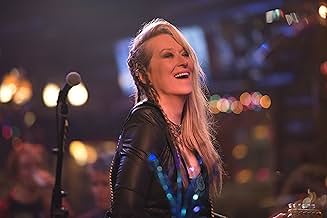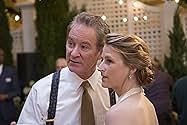IMDb-BEWERTUNG
6,0/10
25.266
IHRE BEWERTUNG
Eine Musikerin, die ihren großen Traum, ein Rock 'n' Roll-Star zu werden, an den Nagel gehängt hat, kehrt nach Hause zurück, um ihre Familienangelegenheiten in Ordnung zu bringen.Eine Musikerin, die ihren großen Traum, ein Rock 'n' Roll-Star zu werden, an den Nagel gehängt hat, kehrt nach Hause zurück, um ihre Familienangelegenheiten in Ordnung zu bringen.Eine Musikerin, die ihren großen Traum, ein Rock 'n' Roll-Star zu werden, an den Nagel gehängt hat, kehrt nach Hause zurück, um ihre Familienangelegenheiten in Ordnung zu bringen.
- Auszeichnungen
- 4 Nominierungen insgesamt
Jim Wheeler
- Elvis Guy
- (as Big Jim Wheeler)
Aaron Moten
- Troy
- (as Aaron Clifton Moten)
Handlung
WUSSTEST DU SCHON:
- WissenswertesThe guitar that Greg pawns is really owned by Rick Springfield. This was the same guitar he wrote "Jessie's Girl" on.
- PatzerWhen Pete is testing Ricki on the PLU codes for various items, she incorrectly states that organic milk is "94011" which is the code for organic bananas. The code she states for bananas is incorrect as well.
- Crazy CreditsThe ending credits are accompanied by a clip of Ricki and the Flash singing "Cold One" at the wedding reception.
Ausgewählte Rezension
First thing: it was smart for Diablo Cody to write that Ricki (Meryl Streep, of course it's her) and the Flash (one of them Rick Springfield of all people, he's real good by the way) as bar musicians in this present day and age. Would they, or could they, be playing more legitimate venues? Possibly. But it's clear as day that Ricki (not her real name, but as she jokes she was 'born really as Ricki') is not leading some great revolution of music - she just likes playing her covers of classic rock songs (with some new stuff, she doesn't leave the 'young people' out of Lady Gaga and Pink).
It shows her and her group at a point in life that isn't the most ideal, but they can get by and play music in front of some kind of audience. This is her at her happiest and most in control, as in her day life, working as a cashier at a chain grocery store (always having to keep a smile on her face, as the condescending boss says), and in her personal life (her family hasn't spoken to her in a long time) it's messy to put it lightly, due to the thing of leaving away to go and follow her dreams.
Ricki is not a sympathetic character, and this follows along with Cody from some other protagonists she's had (remember Young Adult), but also for Jonathan Demme, who has his first (relatively wide-release) fiction feature in seven years, and his own previous film, Rachel Getting Married, was about another family f***-up who doesn't know how to get back in good graces, or even how to say the right things. I don't meant to make comparisons through this whole review, just to point out some interesting similarities, which end pretty much there aside from both movies also having weddings. In this case of 'Ricki', her daughter is in personal turmoil - Kevin Kline, father of her kids and ex, tells her that her husband left her for another woman and her marriage has effectively fallen apart - so she rushes to help her. How can she help her? In reality, Ricki's daughter tried to kill herself.
Some deep stuff dramatically speaking is going on in the movie. So why is this actually kind of, sort of, a 'light' movie, in a sense? I think Demme is smart to keep Cody's script this way, and to trust the instincts of the material; there's no easy way to help Julie (Streep's own daughter, Mamie Gummer) except to make sure she gets the therapy she needs and attention she needs. In one fell swoop Ricki does one and not the other, by taking her to get her hair and nails done and missing her therapy appointment. It's a fun little scene - uh oh, she's using the family credit card again, wop-wop - but there are consequences. And yet what's also good is that Cody not only isn't shy of going to those awkward, cringe-type of scenes, she embraces them. The obvious one is when the family goes out to a dinner, and Ricki's estranged sons (one engaged, which she was ignorant of, and one gay, also ignorant but not in a good way). But watch as Maureen, the new wife and mother for so many years to Ricki's kids, lays it down as to why she really has to leave: what can she REALLY do here for her daughter? That Ricki's just out of the shower adds to the, shall one say, nakedness of the emotional truth here.
Yes, there's some goofy stuff here, like the family finding some pot and smoking it and having some munchies and late-night guitar strumming, but Demme handles it without anything feeling too false or sitcomy. In the wrong hands this could be really disastrous, maudlin stuff. I think it's not a great film by any stretch, but the filmmakers are in sync with one another, and even find ways to make songs played on stage into dramatic beats; Streep and Springfield aren't just singing songs, they're acting and going through some emotional crises of their own, in small and big ways, all down to what it means to be a parent for one's child (love, as it turns out, is the thing a parent must do for their kids, not necessarily the other way around if it comes to it).
So while there are some serious issues dealt with here - depression and suicide, marriage and relationships, abandonment issues, and what love can be shown as - music and a light, mostly comic touch, helps to level out the material. Indeed the climax is done almost like one of those old-time rock n roll movies (Demme has in the past decades done his share of rock docs, and his knack for finding the right angle and cuts shows very well), and as the band plays on at a wedding people can either get up and get into the music, or sit down like schlubs and not get into it. It's a nice, uplifting way to reach a conclusion to this story, especially considering what Ricki's done and gone through, an otherwise flawed and damaged individual (and as usual given a nice turn via Streep), and that music is the one thing that a) she's really good at, far as this kind of music goes on this level, and b) the family can see the good in her when she plays it. It's sincere, but heartfelt stuff.
It shows her and her group at a point in life that isn't the most ideal, but they can get by and play music in front of some kind of audience. This is her at her happiest and most in control, as in her day life, working as a cashier at a chain grocery store (always having to keep a smile on her face, as the condescending boss says), and in her personal life (her family hasn't spoken to her in a long time) it's messy to put it lightly, due to the thing of leaving away to go and follow her dreams.
Ricki is not a sympathetic character, and this follows along with Cody from some other protagonists she's had (remember Young Adult), but also for Jonathan Demme, who has his first (relatively wide-release) fiction feature in seven years, and his own previous film, Rachel Getting Married, was about another family f***-up who doesn't know how to get back in good graces, or even how to say the right things. I don't meant to make comparisons through this whole review, just to point out some interesting similarities, which end pretty much there aside from both movies also having weddings. In this case of 'Ricki', her daughter is in personal turmoil - Kevin Kline, father of her kids and ex, tells her that her husband left her for another woman and her marriage has effectively fallen apart - so she rushes to help her. How can she help her? In reality, Ricki's daughter tried to kill herself.
Some deep stuff dramatically speaking is going on in the movie. So why is this actually kind of, sort of, a 'light' movie, in a sense? I think Demme is smart to keep Cody's script this way, and to trust the instincts of the material; there's no easy way to help Julie (Streep's own daughter, Mamie Gummer) except to make sure she gets the therapy she needs and attention she needs. In one fell swoop Ricki does one and not the other, by taking her to get her hair and nails done and missing her therapy appointment. It's a fun little scene - uh oh, she's using the family credit card again, wop-wop - but there are consequences. And yet what's also good is that Cody not only isn't shy of going to those awkward, cringe-type of scenes, she embraces them. The obvious one is when the family goes out to a dinner, and Ricki's estranged sons (one engaged, which she was ignorant of, and one gay, also ignorant but not in a good way). But watch as Maureen, the new wife and mother for so many years to Ricki's kids, lays it down as to why she really has to leave: what can she REALLY do here for her daughter? That Ricki's just out of the shower adds to the, shall one say, nakedness of the emotional truth here.
Yes, there's some goofy stuff here, like the family finding some pot and smoking it and having some munchies and late-night guitar strumming, but Demme handles it without anything feeling too false or sitcomy. In the wrong hands this could be really disastrous, maudlin stuff. I think it's not a great film by any stretch, but the filmmakers are in sync with one another, and even find ways to make songs played on stage into dramatic beats; Streep and Springfield aren't just singing songs, they're acting and going through some emotional crises of their own, in small and big ways, all down to what it means to be a parent for one's child (love, as it turns out, is the thing a parent must do for their kids, not necessarily the other way around if it comes to it).
So while there are some serious issues dealt with here - depression and suicide, marriage and relationships, abandonment issues, and what love can be shown as - music and a light, mostly comic touch, helps to level out the material. Indeed the climax is done almost like one of those old-time rock n roll movies (Demme has in the past decades done his share of rock docs, and his knack for finding the right angle and cuts shows very well), and as the band plays on at a wedding people can either get up and get into the music, or sit down like schlubs and not get into it. It's a nice, uplifting way to reach a conclusion to this story, especially considering what Ricki's done and gone through, an otherwise flawed and damaged individual (and as usual given a nice turn via Streep), and that music is the one thing that a) she's really good at, far as this kind of music goes on this level, and b) the family can see the good in her when she plays it. It's sincere, but heartfelt stuff.
- Quinoa1984
- 31. Aug. 2015
- Permalink
Top-Auswahl
Melde dich zum Bewerten an und greife auf die Watchlist für personalisierte Empfehlungen zu.
- How long is Ricki and the Flash?Powered by Alexa
Details
- Erscheinungsdatum
- Herkunftsland
- Offizielle Standorte
- Sprache
- Auch bekannt als
- Ricki and the Flash
- Drehorte
- 600 Tuckahoe Rd, Yonkers, New York, USA(Barney McNabs Bar)
- Produktionsfirmen
- Weitere beteiligte Unternehmen bei IMDbPro anzeigen
Box Office
- Budget
- 18.000.000 $ (geschätzt)
- Bruttoertrag in den USA und Kanada
- 26.822.144 $
- Eröffnungswochenende in den USA und in Kanada
- 6.610.961 $
- 9. Aug. 2015
- Weltweiter Bruttoertrag
- 41.325.328 $
- Laufzeit1 Stunde 41 Minuten
- Farbe
- Sound-Mix
- Seitenverhältnis
- 2.35 : 1
Zu dieser Seite beitragen
Bearbeitung vorschlagen oder fehlenden Inhalt hinzufügen

Oberste Lücke
By what name was Ricki - Wie Familie so ist (2015) officially released in India in Hindi?
Antwort







